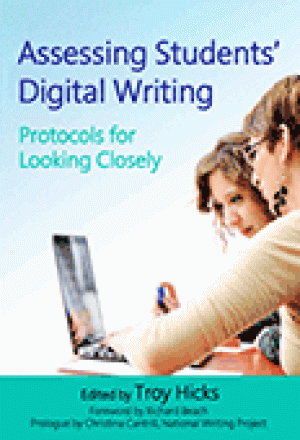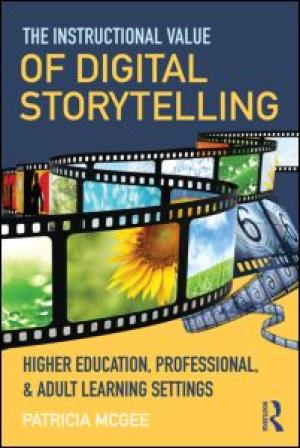Resources

Click Here for Book Review Abstract: In this book, Troy Hicks - a leader in the teaching of digital writing - collaborates with seven National Writing Project teacher consultants to provide a protocol for assessing students’ digital writing. This collection highlights six case studies centered on evidence the authors have uncovered through teacher inquiry and structured conversations about students’ digital writing. Beginning with a digital writing sample, each teacher offers an analysis of a student’s work and a reflection on how collaborative assessment affected his or her teaching. Because the authors include teachers from kindergarten to college, this book provides opportunities for vertical discussions of digital writing development, as well as grade-level conversations about high-quality digital writing. The collection also includes an introduction and conclusion, written by Hicks, that provides context for the inquiry group’s work and recommendations for assessment of digital writing. Book Features: An adaptation of the Collaborative Assessment Conference protocol to help professional learning communities examine students’ digital work. Detailed descriptions of students’ digital writing, including the assessment process and implications for instruction. Links to the samples of student digital writing available online for further review and to be used as digital mentor texts. (From the Publisher)
A spreadsheet Google Doc comparing a range of e-tools that support differentiation of instruction to support learner needs, created and maintained by education consultant John McCarthy.
Faculty and Graduate Students at the University of Arizona published a Literature review on Social Media in Higher Education in 2014. This document includes a good summary and an extensive bibliography.
ProfHacker is a regular blog spot on the Chronicle of Higher Education Website. This link opens a page displaying all its blog posts tagged with the term “twiiter.”
One page Teaching Tactic: active learning strategy in which students use e-tools to research and represent how historic religious events have been portrayed.
Hospitality in the classroom and digital pedagogical practices encourage participatory pedagogy and collective action. This model of learning and teaching emphasizes the shared responsibility between all members to contribute to and actively further the intellectual exchange and critical inquiry of the course; indeed, this model of learning can frame how we understand subjectivity itself.

Click Here for Book Review Abstract: The authors created this manual particularly for beginning instructors at the post-secondary level who have never had formal teacher training. They not only present the essentials of effective instruction that incorporates technology, but in doing so, review key principles and practices that have been shown to enhance students’ motivation to learn. The manual is a distillation of core information derived from both the authors’ own professional experience and the body of literature on teaching effectiveness, learning motivation, and the infusion of technology in post-secondary settings. They draw on their respective educational and research backgrounds that range from the elementary through to the college and university levels. (From the Publisher)
Podcast Series. A podcast exploring conversations of Critical Digital Pedagogy, listening for ways to empower students and champion learning. It’s hosted by Chris Friend from Saint Leo University. It’s the aural side of Hybrid Pedagogy—a digital journal of learning, teaching, and technology.

Click Here for Book Review Abstract: Although storytelling has been recognized as an effective instructional strategy for some time, most educators are not informed about how to communicate a story that supports learning—particularly when using digital media. The Instructional Value of Digital Storytelling provides a broad overview of the concepts and traditions of storytelling and prepares professors, workplace trainers, and instructional designers to tell stories through 21st century media platforms, providing the skills critical to communication, lifelong learning, and professional success. Using clear and concise language, The Instructional Value of Digital Storytelling explains how and why storytelling can be used as a contemporary instructional method, particularly through social media, mobile technologies, and knowledge-based systems. Examples from different sectors and disciplines illustrate how and why effective digital stories are designed with learning theory in mind. Applications of storytelling in context are provided for diverse settings within higher education as well as both formal and informal adult learning contexts. (From the Publisher)
This portion of the website of a UK “registered charity” and promoter of digital technologies in UK education and research, showcases 50 short case studies Investigating students' expectations of the digital environment and enhancing the student digital experience in higher education, organized according to the main challenges they address.